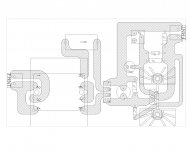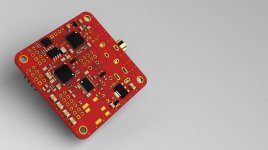I'm working on a cross reference parts list for Mouser at Mouser.com. It's almost complete. I've attached it in it's current form and will update as I continue on it. Feel free to use it, but please keep in mind that I just based it on my rudimentary understanding of the parts needed. If you see something incorrect, please feel free to let us know. Also, I'm going to be providing alternate parts for connectors as I plan on putting this in an enclosure so some of the connectors will be chassis mount instead of board mount.
Thanks DSchmidt!
Does anyone have a replacement part for the WIMA caps on this board? In the US, these are VERY expensive!!
12 x $2.39 = $$$, considering the cost of the rest of the parts. I think they are 1/4th the price on that German website (though it seems they don't ship to US).
... Does anyone have a replacement part for the WIMA caps on this board? In the US, these are VERY expensive!!
Have you priced them at Mouser??
Have you priced them at Mouser??
Yes -- $2.39/ea is the single piece cost. I should have checked the qty10 cost as per the BOM. That is $1.99/ea.
Still, it seems there is a very high markup compared to what they cost in Germany. If there were an alternate capacitor that could be used, it could knock $10-15 off of the BOM.
Get yourself some 1uF MKS/MKT, this is still enough. With 18k in series (+2k internal), you'll have:
1/2*pi*R*C -> 1/2*3.1415926*(18k+2k)*1uF = 7.96Hz low fu(-3dB)
(The original 2*4.7uF results in a 0.87Hz fu.. yeah, sure.. )
So you just need one of those:
http://www.mouser.com/ProductDetail...=sGAEpiMZZMv1cc3ydrPrF7l45uRd9dVh4k4wYzb/PR0=
or
http://www.mouser.com/ProductDetail...=sGAEpiMZZMv1cc3ydrPrF512ADDNLQZJ4EtB0f8sKfI=
or
http://www.mouser.com/ProductDetail...=sGAEpiMZZMv1cc3ydrPrF0/KYujtVgoK7G/U9Kjky50=
(The last 2 are identical, just different package from Kemet.)
per channel, or use 2 in parallel.
I use 1uF X7R (flexcap) on our boards.
(Ceramics are not that bad, piezoelectric effects aka noise highly depends on size and layout)
1/2*pi*R*C -> 1/2*3.1415926*(18k+2k)*1uF = 7.96Hz low fu(-3dB)
(The original 2*4.7uF results in a 0.87Hz fu.. yeah, sure.. )
So you just need one of those:
http://www.mouser.com/ProductDetail...=sGAEpiMZZMv1cc3ydrPrF7l45uRd9dVh4k4wYzb/PR0=
or
http://www.mouser.com/ProductDetail...=sGAEpiMZZMv1cc3ydrPrF512ADDNLQZJ4EtB0f8sKfI=
or
http://www.mouser.com/ProductDetail...=sGAEpiMZZMv1cc3ydrPrF0/KYujtVgoK7G/U9Kjky50=
(The last 2 are identical, just different package from Kemet.)
per channel, or use 2 in parallel.
I use 1uF X7R (flexcap) on our boards.
(Ceramics are not that bad, piezoelectric effects aka noise highly depends on size and layout)
Attachments
Last edited:
I read the getting started guide of freeDSP and it seems that Windows OS is mandatory in order to execute sigmaStudio. If you suppose to have already the final output file, what about directly programming the freeDSP from Raspberry Pi by using or not Arduino micro?
Get yourself some 1uF MKS/MKT, this is still enough. With 18k in series (+2k internal), you'll have:
1/2*pi*R*C -> 1/2*3.1415926*(18k+2k)*1uF = 7.96Hz low fu(-3dB)
(The original 2*4.7uF results in a 0.87Hz fu.. yeah, sure.. )
So you just need one of those:
MKS2C041001F00JC00 WIMA | Mouser
or
R82DC4100DQ60J Kemet | Mouser
or
R82DC4100AA60J Kemet | Mouser
(The last 2 are identical, just different package from Kemet.)
per channel, or use 2 in parallel.
I use 1uF X7R (flexcap) on our boards.
(Ceramics are not that bad, piezoelectric effects aka noise highly depends on size and layout)
Thanks! I agree that 1uF should be fine and using one of these instead will save $20 on the BOM cost.
USB Programmer
Any information available on third party USB programmers that work with the Studio software?
Any information available on third party USB programmers that work with the Studio software?
There you go:
If you only want to program the eeprom, you may go with a cheap CH341A eepromer.
The first run of pre-orders just finished, that's the reason why you can't order any freeDSP-kits on our website anymore. Because this is a spare-time project for us, we cannot store pre-packed kits until someone calls us to buy them ;-)
For adjustments on the fly, I just heard about a cheap alternative for the USBi-programmer, somewhat like a USBi-clone.
You could buy the module on eBay: CY7C68013A 56 EZ USB FX2LP USB2 0 Develope Board Module Logic Analyzer EEPROM | eBay
And then refer to these topics:
ELEKTOR FORUMS • View topic - ADAU1701 Universal Audio DSP Board
https://ez.analog.com/thread/11612?start=30&tstart=0
USBee SX/ZX Hack - Project Server
USBee AX Pro reprogramming | Bits and Bytes
I just took a look into the ADAU1452, sounds pretty interesting. We will do some testing with it and try it out 🙂
If you only want to program the eeprom, you may go with a cheap CH341A eepromer.
Correct. I know someone who actually does this with a miniDSP - they wait for some short time until the EEPROM data is loaded and then they take over via i2c.
The miniDSP doesn't use self-boot mode. It has an EEPROM, but it isn't for the ADAU1701. Pin 6 of the ADAU1701 is grounded on the miniDSP, so self-boot is disabled.
The ADAU1701 on the miniDSP is loaded by the micro. Once the micro is done you can take over the I2S bus.
ADI does not recommend trying to control the ADAU1701 from a micro after a self-boot. See this article: https://ez.analog.com/message/14318#14318. It might work OK in some cases, but there are some timing requirements for multi-master I2C control that are hard to meet using off-the-shelf I2C software. I tried it and it actually seemed to work OK, but I gave up on that approach in favor of loading from a micro.
Last edited:
As long as the ADAU1701 is not writing on the bus i see no problems there. (It only will at power-down if you configured em to do so)
The guy at: "https://ez.analog.com/message/14318#14318" is just doing it "not right".
The guy at: "https://ez.analog.com/message/14318#14318" is just doing it "not right".
Last edited:
So, I can program freeDSP EEPROM directly from Raspberry by using I2C bus. What about online reprogramming?
Suppose I made two different filters with sigma studio and then I can program the freeDSP with the first filter and then I can use it. After a while, if I decide to reprogram the freeDSP with the second filter, can I do it? Or I have to restart the ADAU1701 or to make some weird procedure?
Thank you
Suppose I made two different filters with sigma studio and then I can program the freeDSP with the first filter and then I can use it. After a while, if I decide to reprogram the freeDSP with the second filter, can I do it? Or I have to restart the ADAU1701 or to make some weird procedure?
Thank you
You'll always have to reset the ADAU to load up the new code from the EEPROM. The USBi takes care of that. You can also implement both filters and switch between them with a GPIO. (needs to be designed in SigmaStudio)
Here's the cart i put together from digikey. It's in 5pcs quantity so adjust accordingly. *say the BOM needed 40pcs of a part, but if i ordered 50pcs, it was cheaper then the 40. I did this for several components. So if you're wondering why everything doesn't scale exactly to that 5pc qnty that's why.
http://www.digikey.com/short/72qhwn
http://www.digikey.com/short/72qhwn
I haven't built a through whole board in years... This is a PITA!
Sure SMT components are smaller and need to be handled with tweezers. But you just plop down a bit of solder, bring the component over and touch it and it's set. None of this awkward pulling the components from the lines, forming the long leads and wrangling it into position then solder, and check the back for proper wetting and trim. Oof!
Either way it's all coming along and I'm excited to get my 1452 Eval board back in eval status, and deploy these critters!

I'm keeping my motivation high by listening to the system that I want to set this up on. Keeps the iron hot 😉
Sure SMT components are smaller and need to be handled with tweezers. But you just plop down a bit of solder, bring the component over and touch it and it's set. None of this awkward pulling the components from the lines, forming the long leads and wrangling it into position then solder, and check the back for proper wetting and trim. Oof!
Either way it's all coming along and I'm excited to get my 1452 Eval board back in eval status, and deploy these critters!

I'm keeping my motivation high by listening to the system that I want to set this up on. Keeps the iron hot 😉
DShmidt
For your PSU You could have forgone the LM317 and plumbed the rectified 12v right into the input. It has a LM1117 3.3v reg right there on the front end.
Also the input and output filter caps in the digikey cart I posted aren't the ideal items. And the RCA's are too short so you have to trim and modify the body a bit. They used a 18mm deep RCA, most i've seen so far are ~10. So be aware.
For your PSU You could have forgone the LM317 and plumbed the rectified 12v right into the input. It has a LM1117 3.3v reg right there on the front end.
Also the input and output filter caps in the digikey cart I posted aren't the ideal items. And the RCA's are too short so you have to trim and modify the body a bit. They used a 18mm deep RCA, most i've seen so far are ~10. So be aware.
How hard could that be?
It is developed using Microsoft's proprietary and windows-only .NET framework.
To answer your question simply: very hard - a complete rewrite.
Hello everyone!
great to hear that there's so much interest in freeDSP. After the first pre-order run was sold out very quickly, we're planning a new group order very soon. Please subscribe to our newsletter to receive any information about upcoming order possibilities 🙂
Enjoy you day!
What newsletter? Your website doesn't work any more.
What newsletter? Your website doesn't work any more.
Hey everyone,
I can't find any problems with our homepage:
freeDSP | An Open-Source Low-Budget Audio DSP
We're probably starting a new order-run this week 🙂
regards
Ludwig
As nice as it is, I can find several. Your web designer is killing you with image files that 10X larger than they should be. They are in PNG format, which is large, probably for the alpha channel. Even so, the files sizes are much too large and cause slow loading and eat up bandwidth. Should be an easy fix.I can't find any problems with our homepage:
- Home
- Source & Line
- Digital Line Level
- freeDSP - an open source 2-in 4-out digital crossover board

